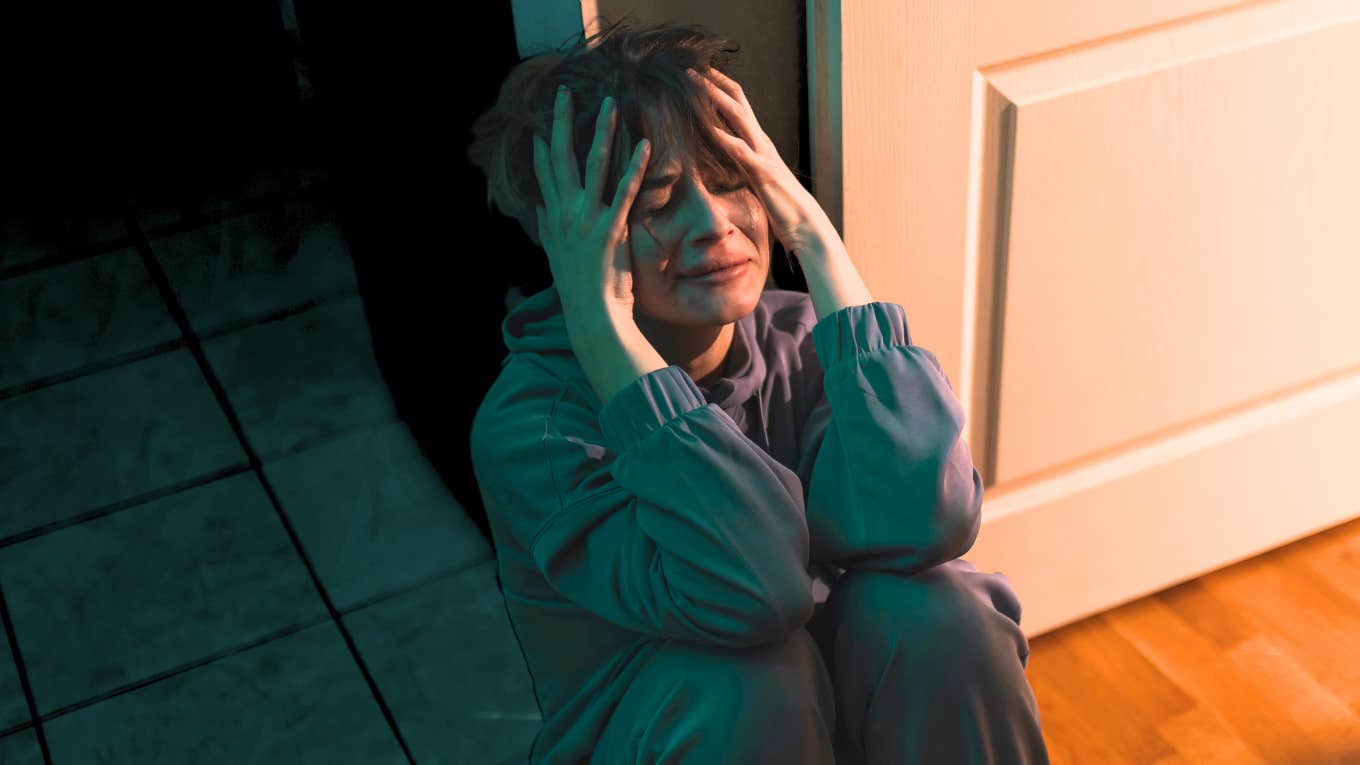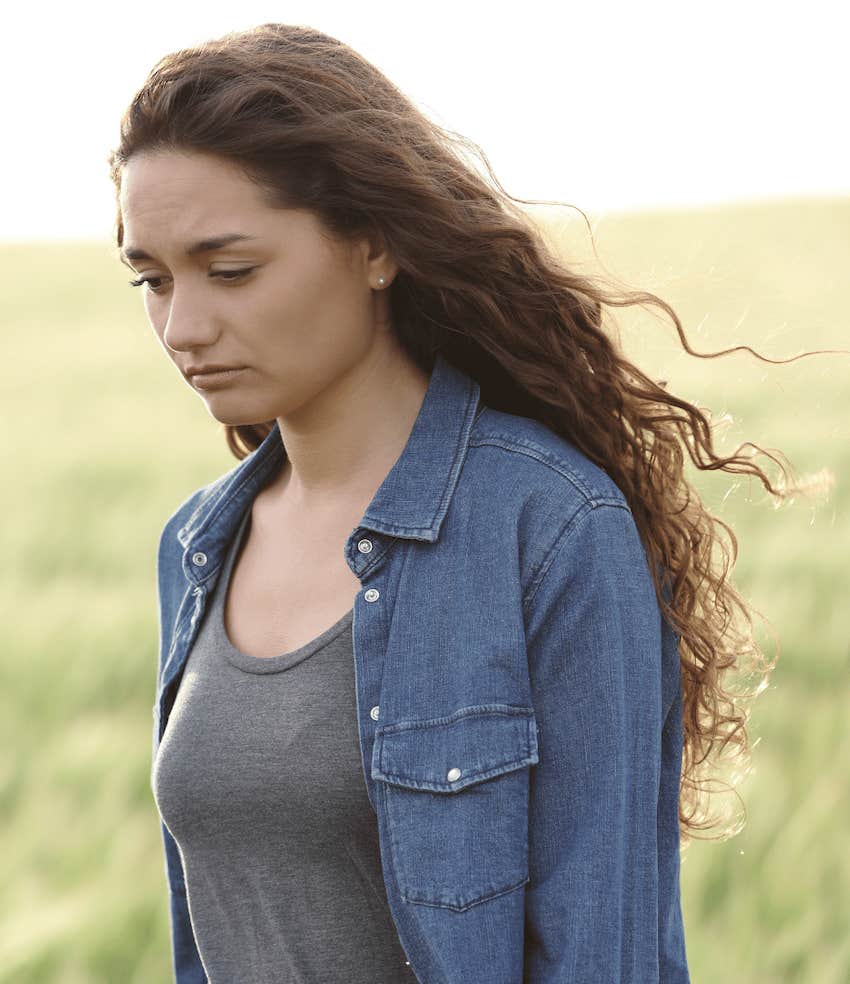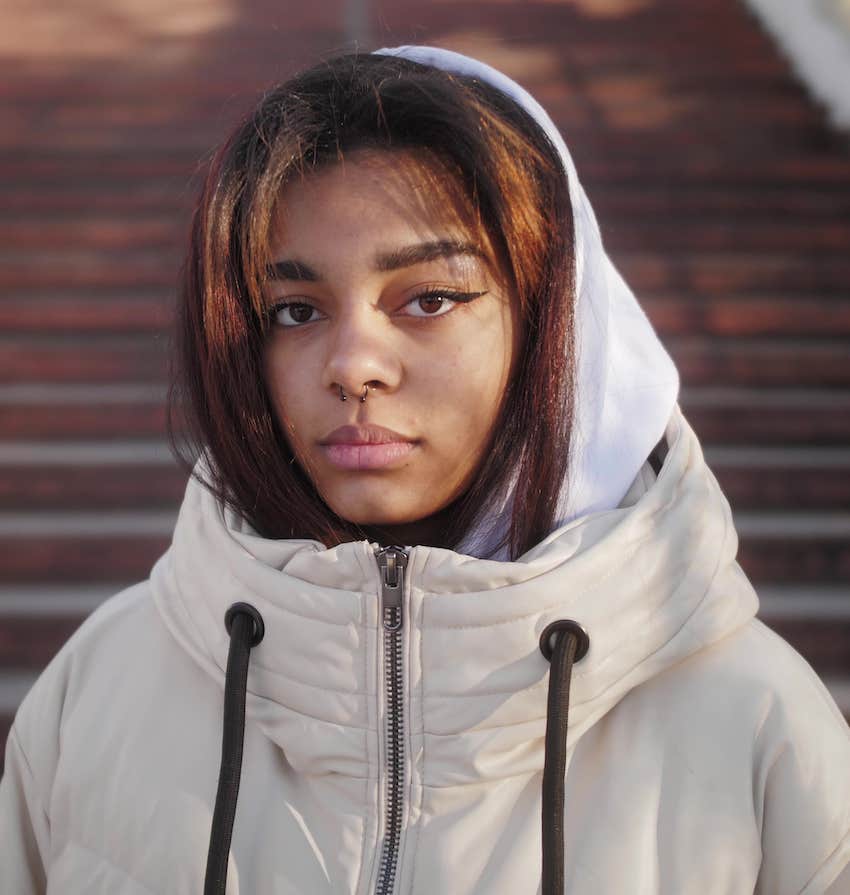I Didn't Realize I Was In A Horrifyingly Abusive Relationship Until My Therapist Flagged One Thing
Abuse takes many forms, and sometimes requires an outsider's perspective to identify.
 vladans | Canva
vladans | Canva “You’re right, I’m sorry.”
I can’t tell you how many times that sentence has come out of my husband’s mouth after having the same hushed argument repeatedly. I confront him about a new crop of ATM withdrawals and plead with him to be more open and honest, and he promises never to do it again. (Fill in the excuse here.) He’s sorry, I’m right.
It got to the point where those four words made me rage. I can’t keep having this same fight. I can’t keep screaming into the void. I can’t keep being ignored, hurt, and lied to. I can’t keep spinning around in this endless cycle.
I’ve recently started writing about my husband’s struggle with opiate addiction, and so the inherent abuse might seem obvious. But it wasn’t to me.
It took many rounds of enduring the addict’s cycle — deception, denial, confession, remorse, broken promises — for me to get good at recognizing it. After several years, I started to see my life from a zoomed-out lens. I could recognize the cycle but still feel frozen with hope and denial.
Counselor Christopher Shea explained how the family is impacted by addiction, "I like to refer to addiction as a "family disease" since the family unit is greatly impacted by an individual member's active illness. As the disease of addiction progresses and the person with the disease begins to change their behavior, attitudes, and how they deal with the family, the family unit changes their behaviors and thoughts to cope with the changes of the person with addiction."
“It’s like I’m that girl in an abusive relationship,” I told my therapist one day with a box of tissues on my lap.
“You are in an abusive relationship,” my therapist plainly and quickly responded, as if it were an undeniable, clinical fact.
He repeated the sentence two more times, perhaps to sink in, and I was surprised by how my body reacted. I felt relief. I am in an abusive relationship. I am in an abusive relationship.
 Antonio Guillem via Shutterstock
Antonio Guillem via Shutterstock
Perhaps I just needed to hear it from an outside perspective to have my deepest feelings validated.
A large part of living with an addict is being made to think I’m the problematic one, and so I’ve questioned my judgment constantly. Maybe I needed that final shove into clarity.
The thing is, my relationship doesn’t seem abusive in the light of day. He never hit me or acted aggressively, not ever. He’s never raised his voice, even when I’ve lost my cool in a fiery rage. He’s never even said an unkind word to me — the way some men hurl nasty, hurtful insults in the heat of the moment. Not my husband. He’d never say anything to intentionally hurt me. He’s funny and charming and affectionate.
His actions, on the other hand, are anything but loving. I’ve been hurt in real, tangible ways; it’s just easier to hide a bank account and a credit score than it is to cover up a bruise. It’s easier to ignore a growling stomach than a verbal attack.
This kind of abuse is subtle and easily justified.
I understand how a drug addict’s brain is wired for selfishness and deception, as supported by research in the European Journal of Psychotherapy and Counselling. I see how much he struggles under the weight of an out-of-control situation, so I tolerate his behavior under the guise of “compassion” or “being a good wife.” But as soon as my therapist confirmed this was, in fact, abuse, I could finally see clearly.
I am being abused by a loving and kind man who doesn’t intentionally want to hurt me but consistently does. My life is being controlled and consumed by my partner’s compulsions; my basic needs are being ignored. I know he wants to do better, I know he wants to love me, but this isn’t love; it’s abuse.
After my revelation, I reached out to my online community. I asked if anyone had experience with an abusive relationship that didn’t initially look like abuse and was flooded with responses.
Some women spoke of emotional and verbal abuse, others about abuse from a mental illness, and others were reluctant to use the “abuse” label at all, even though they described alcohol- or stress-induced rage.
“The difference between abuse and ‘normal’ marital problems (which we all have) is your stake in the issue,” said Kelsey Rodriguez, a reader who works with domestic violence victims. “Do you feel like you are heard? Are they ‘fair’ arguments? Do you feel like you’re giving as much as you are taking? Listening to your instincts can be hard when the person you love is telling you that your instincts are wrong, but it is the only way to determine how to proceed.”
Rodriguez went on to say that she’s seen most women stay in abusive relationships because of “the desire to remain a two-parent household, have financial stability, and not disappoint family or friends.” I relate to all of these reasons.
 VN_KK via Shutterstock
VN_KK via Shutterstock
Maybe once the labels are made and the sentence is said out loud — I am in an abusive relationship — it ultimately comes down to self-respect and self-love.
We can either stay in the cycle, identifying as the victim, or get out. Of course, "getting out" is easier said than done, even without the threat of violence. We often ask how a person can stay in an abusive relationship, but divorce attorney Ronald Bavero sees it the opposite.
"The essential question is not how people stay in such unhealthy, unsatisfying relationships but rather how they manage to get out, given all the barriers and hurdles put in place by the controlling spouse," Bavero explains. "The answer is to break the cycle of control and to remove the barriers one by one. Contrary to the message often advanced by the controlling spouse or partner, getting out of an unhealthy, unsatisfying, or abusive relationship is not only possible but also life-affirming."
It's hard to unlatch myself from this cycle and mourn the loss of my marriage. Separating from a man I'm in love with and asking the father of my child to move out, knowing how upset our son will be, is nothing short of devastating. This is hard and scary and deeply sad, but it's also necessary.
I cannot be that girl in an abusive relationship — not anymore. Not anymore.
If you think you may be experiencing depression or anxiety as a result of ongoing emotional abuse, you are not alone. Domestic abuse can happen to anyone and is not a reflection of who you are or anything you've done wrong. If you feel as though you may be in danger, there is support available 24/7/365 through the National Domestic Violence Hotline by calling 1-800-799-7233. If you’re unable to speak safely, text LOVEIS to 1-866-331-9474.
Michelle Horton is a writer and advocate. Through the Nicole Addimando Community Defense Committee, she speaks out for her sister and the countless other victims of domestic violence criminalized for their acts of survival. She's the author of Dear Sister: A Memoir of Secrets, Survival, and Unbreakable Bonds.

